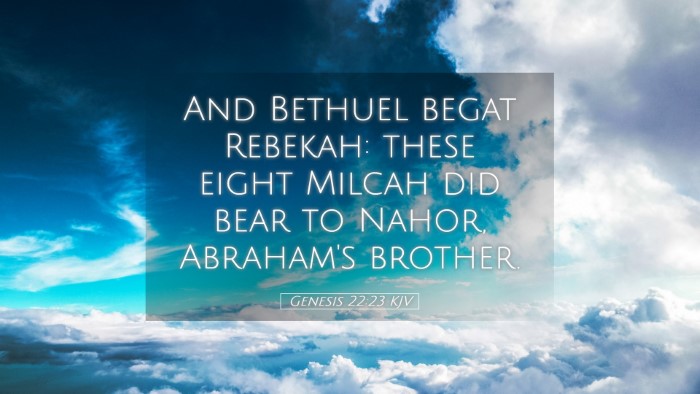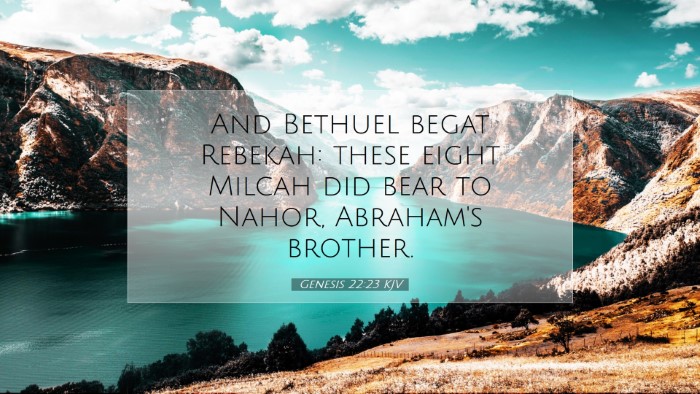Genesis 22:23 Commentary
Genesis 22:23 states: "And Bethuel begat Rebekah: these eight Milcah did bear to Nahor, Abraham's brother." This verse serves as a link in the genealogical account and has theological significance beyond mere ancestry.
Contextual Background
This verse occurs in the context of Abraham's family lineage, which is critical not only for the historical narrative of Genesis but also for establishing the covenant lineage. The mention of Rebekah, who would become Isaac’s wife, signifies divine providence orchestrating the continuation of Abraham’s lineage.
Insights from Matthew Henry
Matthew Henry emphasizes the importance of family in the unfolding of God's covenant promises. He notes that the lineage of Abraham through Rebekah is significant as it demonstrates God's fulfillment of His promise to Abraham to make him the father of many nations. Henry points out that God chooses individuals and families not by their merit but according to His sovereign will, establishing a pattern of grace throughout biblical history.
Insights from Albert Barnes
Albert Barnes stresses the importance of Milcah’s offspring in the context of God’s plans. He interprets the mention of the eight children born to Milcah as indicative of God’s blessings upon Nahor, Abraham's brother, and reflects on how God’s blessings extend beyond Abraham's immediate family. Barnes points out that Rebekah’s role is pivotal in God’s plan, as she is integral to the fulfillment of the covenant promise through Isaac.
Insights from Adam Clarke
Adam Clarke provides a detailed examination of the significance of Rebekah’s introduction. He notes that Rebekah’s lineage illustrates God’s intention to bring forth a chosen people through specific families, signifying that divine choice often rests in everyday life’s circumstances. Clarke emphasizes that this verse serves as a reminder of the importance of faith and obedience in the lives of those who are chosen, as seen through Rebekah’s story in later chapters.
Theological Implications
This verse has several theological implications for understanding God’s divine plan:
- Covenantal Faithfulness: The genealogical record serves as a reminder that God is faithful to His promises. The mention of Rebekah indicates that God has chosen individuals to fulfill His purposes.
- Divine Providence: The interconnected stories of the patriarchal narratives demonstrate that God’s providence governs even the traditional family structures. Each character plays a specific role in God's redemptive plan.
- God's Sovereignty: The narrative emphasizes that God selects people for His purposes, often contrary to human expectations. This theme recurs throughout Scripture, culminating in the New Covenant through Jesus Christ.
Application for Today
The insights gleaned from Genesis 22:23 encourage today’s believers to reflect on several areas:
- The Importance of Heritage: Understanding our spiritual and physical lineage can help us appreciate God’s work in our families and communities, encouraging us to raise our children in faith.
- Obedience to God's Calling: Just as Abraham followed God's instructions, believers today are called to trust and obey even when the direction may not be clear.
- Being Prepared for God’s Plan: The life of Rebekah shows the importance of being open to God's calling, which might lead us to roles that contribute to His plan in unexpected ways.
Conclusion
Genesis 22:23, while seemingly a simple genealogical note, is laden with deep theological truths concerning God’s sovereignty, faithfulness, and providential care. It reminds us that God is actively working through history, using families and individuals to fulfill His divine purposes. Such reflections are crucial for pastors, theologians, and students alike, encouraging a deeper understanding of Scripture and its application in our living faith.


